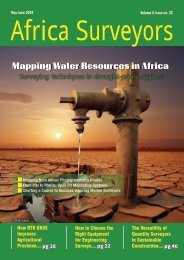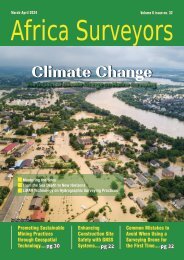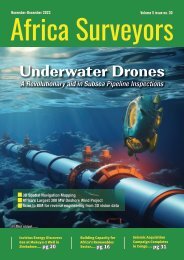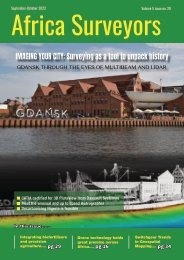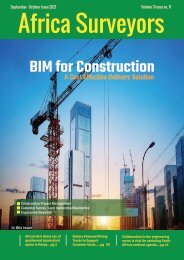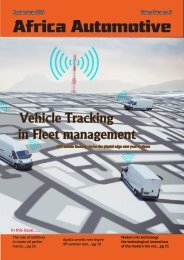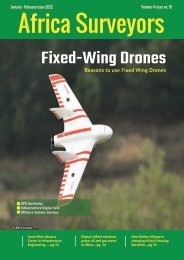Africa Surveyors May-June issue 2023 digital
Africa Surveyors is Africa’s premier source of Surveying, Mapping and Geospatial news and an envoy of surveying products/service for the Construction, Maritime, Onshore & Offshore energy and exploration, Engineering, Oil and Gas, Agricultural and Mining sectors on new solution based trends and technology for the African market.
Africa Surveyors is Africa’s premier source of Surveying, Mapping and Geospatial news and an envoy of surveying products/service for the Construction, Maritime, Onshore & Offshore energy and exploration, Engineering, Oil and Gas, Agricultural and Mining sectors on new solution based trends and technology for the African market.
You also want an ePaper? Increase the reach of your titles
YUMPU automatically turns print PDFs into web optimized ePapers that Google loves.
DRONES<br />
Utilizing Drone Technology To<br />
Advance Development In <strong>Africa</strong><br />
Image Credits: courtesy<br />
Adoption of drone technology in <strong>Africa</strong> has come a long way.<br />
What was once viewed as a foreign concept is now widely<br />
adopted across <strong>Africa</strong> for socio and economic purposes.<br />
Its diverse applications on the continent in different sectors and<br />
industries have eclipsed many other parts of the world. This proves<br />
that if harnessed for good, use of drones will make a difference in how<br />
we tackle existing <strong>issue</strong>s within <strong>Africa</strong>.<br />
A good example to begin with is an unlikely one that has had a<br />
huge impact. In East <strong>Africa</strong>, there has been a race to outsmart desert<br />
locusts with drones and data. According to the Kenya Agricultural and<br />
Livestock Research Organization (KALRO), one swarm of locusts can<br />
comprise of up to four million insects and is estimated to eat food that<br />
can be consumed by about 35,000 people a day.<br />
In an aim to mitigate such risks, KARLO, alongside FutureWater and<br />
HiView through the ThirdEye project, now provides farmers with<br />
important and relevant information on seeds, water, pesticides, and<br />
labor to increase efficiency and production. So far, six flying sensor<br />
operators have been trained and equipped with tools to analyze the<br />
obtained imagery and offer advice to farmers allowing them to scout<br />
farm fields quickly and efficiently rather than evaluate their farms<br />
manually on foot or by tractor.<br />
Thanks to technological advancements that have made them more<br />
nimble, adaptable, affordable, and simple to operate, drones are being<br />
used in ways that either directly or indirectly save the environment.<br />
Image courtesy<br />
In Zimbabwe, drones are now part of efforts to control infestation of<br />
tsetse flies and quelea birds. Further south, agriculture fields could be<br />
destroyed by little rainfall, very dry seasons, swarms of pests like the<br />
locust invasion in the summer of 2021/22, and outbreaks of disease<br />
– resulting in massive losses. The drone systems are developed to<br />
monitor pests and illnesses, anticipate yields, inform markets, and<br />
help decision-making in land-use planning in addition to making use<br />
of earth observation, climate change modelling, big data, and data<br />
analytics.<br />
While the potential of drones within the environment and agriculture<br />
space in <strong>Africa</strong> has not even scratched the surface, there is great<br />
progress so far as scientists, environmentalists, and engineers use<br />
unmanned aircrafts as land surveying tools; lower-resolution satellite<br />
photographs assist in mapping and environmental monitoring. Drones<br />
are suitable for faraway or hard-to-reach places since they can execute<br />
30 <strong>May</strong>-<strong>June</strong> <strong>issue</strong> l <strong>2023</strong> www.africasurveyorsonline.com




